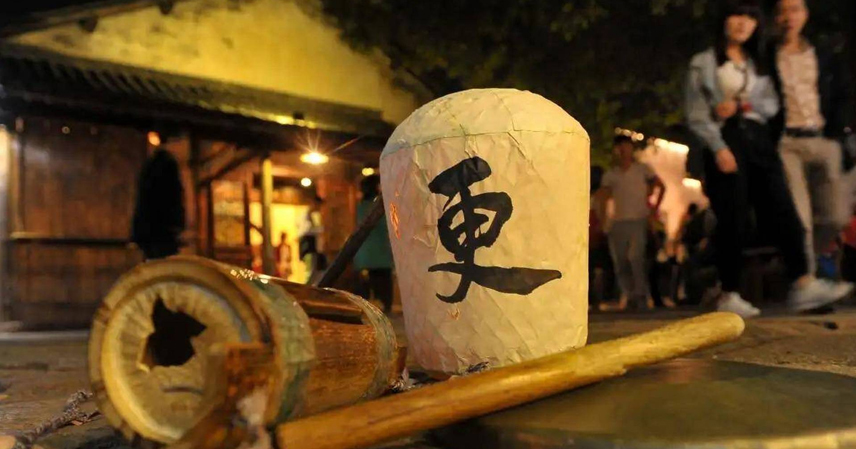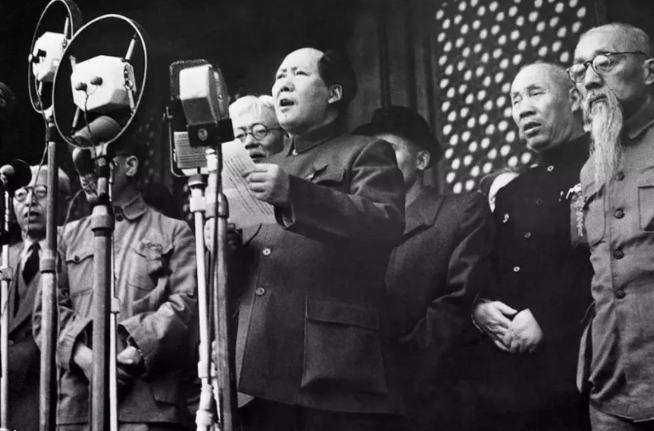In the dead of night, a sharp clack of wooden clappers and the resonant clang of a bronze gong shatter the silence, followed by a booming call: “Dry weather, beware of fire!” To modern ears, this seems like pure nuisance—why wake everyone up? In today’s world, it’d spark complaints and fines. Yet, for ancient Chinese, these sounds were a lullaby of security. Night watchmen (gengren), armed with clappers and gongs, patrolled alleys not to disturb sleep but to safeguard lives. Their role blended timekeeping, fire prevention, theft deterrence, and even spiritual comfort—a testament to ancient ingenuity in a clockless, perilous era.
Pre-Clock Darkness: How to Tell Time Without Light?
Before clocks, phones, or alarms, days were easy—sun position marked hours. Nights? Pitch black, no candles wasted on the poor. Farmers needed dawn cues for fields; merchants, opening times; scholars, study schedules. A long night couldn’t pass in fog.

The solution: night watch system. Emerging in the Qin Dynasty (221–206 BCE) for military shifts, it civilianized by the Han (206 BCE–220 CE). Officials assigned patrols to announce hours every two hours (one geng).
Nights divided into five geng (7 PM–5 AM):
- 1st (zi): 7–9 PM
- 2nd (chou): 9–11 PM
- 3rd (yin): 11 PM–1 AM
- 4th (mao): 1–3 AM
- 5th (chen): 3–5 AM
Each geng signaled thrice—15 beats total nightly. Dawn ended shifts as roosters crowed.
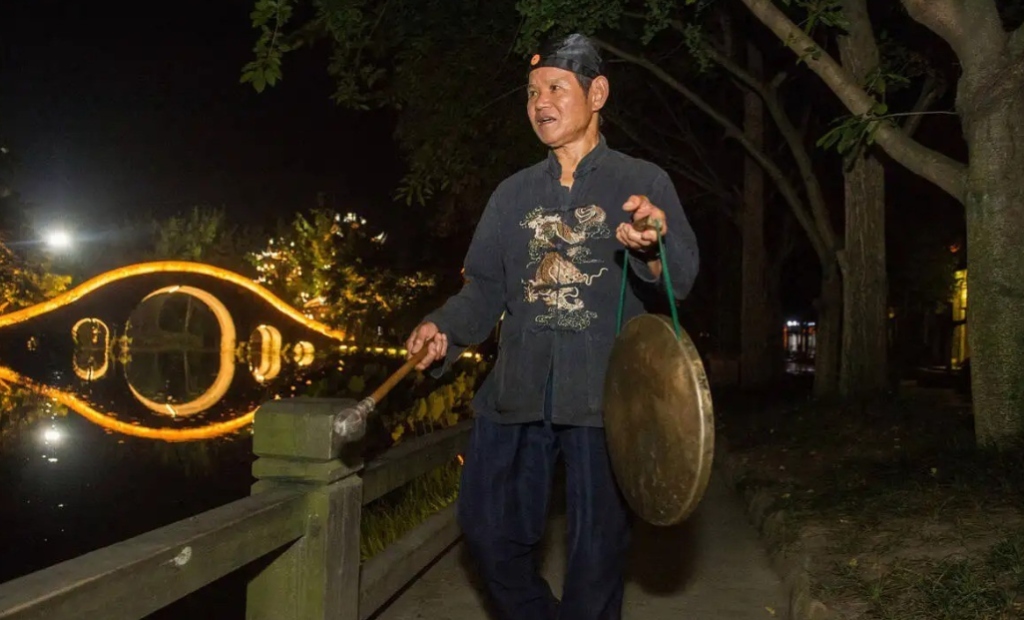
Who Were These Hardy Souls?
A grueling job: year-round patrols in wind, rain, frost, or mosquito swarms, covering 10+ miles nightly. Pairs worked—one with bamboo clappers (crisp, piercing), one with bronze gong (deep, far-carrying). Some added bamboo boards or wooden fish for rhythm.
Recruits varied: young men for steady pay; elders or disabled for light duty; poor families’ breadwinners. Government stipends were meager, but reliable. Socially low—scorned by scholars, merchants, farmers—yet indispensable. Without them, nights felt eerie.
Fire Prevention: The Core Mission
Wooden homes, thatched roofs, straw mats—tinderboxes. Fires spread like wildfire, especially at night when all slept. One spark could raze blocks.
Watchmen’s chant—”Dry weather, beware of fire!”—urged extinguishing hearths and candles. In droughts, it was lifeline. Patrols scanned for smoke or glow, switching to rapid gongs as alarms. Neighbors mobilized buckets and hooks—early discovery minimized loss.
Dynasties mandated fire duties: unreported blazes meant penalties; poor response, liability. Watchmen were a town’s nocturnal firewall.
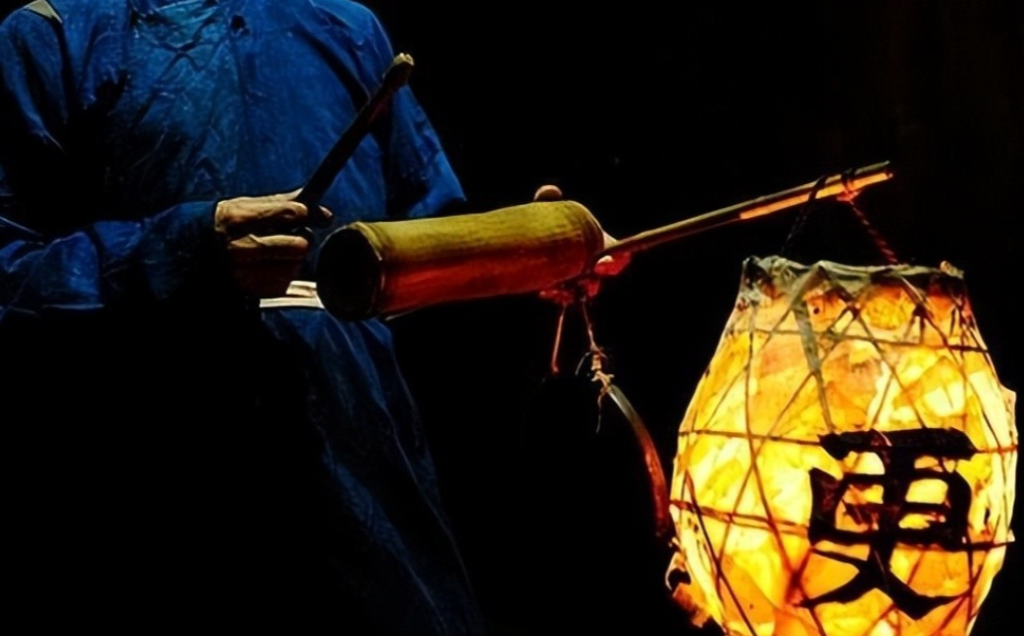
Theft Deterrence: A Sonic Shield
Ancient security was lax—thieves thrived in darkness. Regular clangs signaled patrols, forcing crooks to hide, slashing efficiency. Suspicious figures? Watchmen probed, shouted, gonged for backup. Familiar with alleys, they aided yamen runners in blockades or message relays. No arrest powers, but their presence curbed crime.
Spiritual Solace: Banishing Night Terrors
Roots in superstition: loud noises warded evil spirits during “yin-heavy” nights. Rhythmic beats reassured the vulnerable—elders, women, children—that guardians watched. On Ghost Festival, denser patrols with exorcism chants soothed fears.
Beyond utility, gongs offered companionship—a heartbeat in the void, embedding in cultural psyche.
The Clock’s Arrival: A Ticking End
In 1601, Jesuit Matteo Ricci gifted Emperor Wanli a self-striking clock. Palace eunuchs marveled; it chimed autonomously. Rare at first—costly, complex—folk relied on watchmen.
By mid-Qing, artisans replicated them affordably. Wealthy homes hung clocks; shops and schools adopted precision. Complaints arose: gongs now “noisy.” Urban elites pushed reductions.
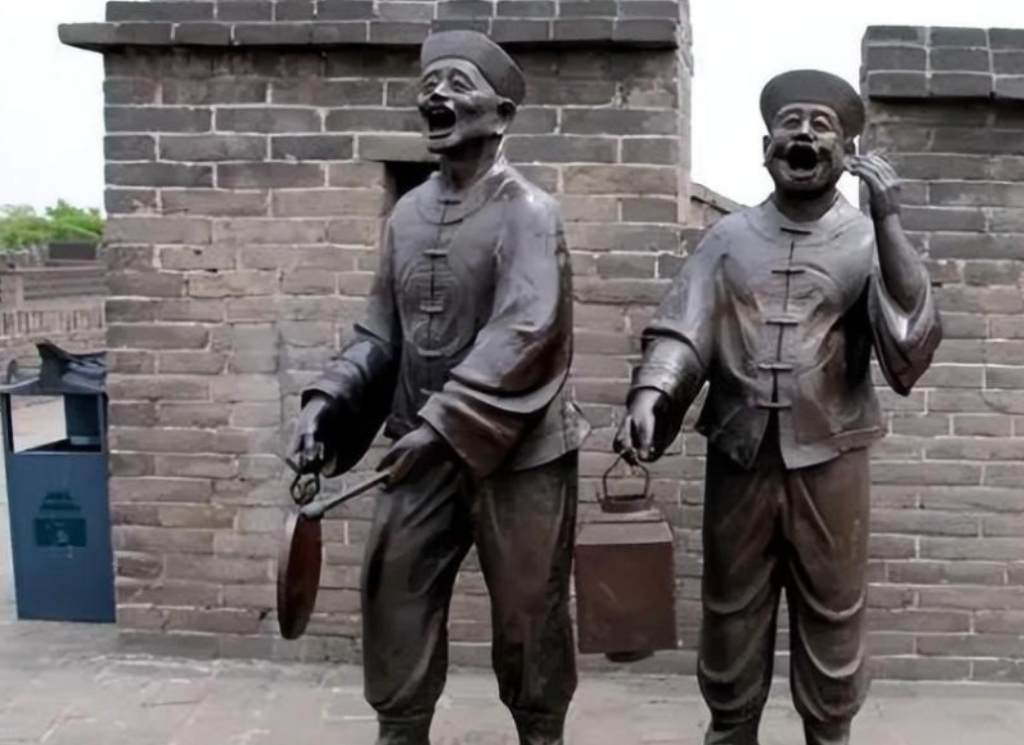
Modernization’s Curtain Call
Electricity democratized clocks—cheap, accurate alarms everywhere. Streetlights brightened nights; police and fire brigades professionalized patrols.
Early 20th century: Big cities banned watchmen as “backward.” Shanghai, Beijing, Guangzhou embraced Western management. Rural areas lingered longer, but electrification sealed the fate.
Last watchmen—aging veterans—felt lost without midnight rounds, waking habitually to phantom duties.
Legacy of the Night Guardians
From Qin-Han origins to modern fade, watchmen solved timeless woes with clappers and gongs: time, fire, theft, fear. Their wisdom—simple tools for complex needs—earned reverence. Today, we sleep under tech’s glow, but owe a nod to those who patrolled the dark, ensuring dawn’s safe arrival.
References
- Needham, J. (1965). Science and Civilisation in China, Vol. 4: Physics and Physical Technology. Cambridge University Press.
- Han Dynasty Records. (c. 100 CE). Book of Later Han: Officials and Duties.
- Schafer, E. H. (1977). Ancient China: Studies in Early Civilization. Time-Life Books.
- Tang Code. (653 CE). Fire Prevention Statutes.
- Song Dynasty Local Gazetteers. (c. 1200 CE). Patrol and Alarm Protocols.
- Ming Veritable Records. (1500s). Night Watch Regulations.
- Bodde, D. (1991). Chinese Thought, Society, and Science. University of Hawaii Press.
- Qing Dynasty Folklore Collections. (1800s). Superstitions and Night Rituals.
- Gernet, J. (1996). A History of Chinese Civilization. Cambridge University Press.
- Ricci, M. (1615). Journals on China (Translated by Trigault, 1953).
- Elman, B. A. (2005). On Their Own Terms: Science in China, 1550–1900. Harvard University Press.
- Modernization Reports. (1920s). Shanghai Municipal Archives on Urban Reforms.
- Oral Histories. (1980s). Interviews with Former Watchmen in Rural China.
- Cultural Relics Journal. (2000). Evolution of Timekeeping in Ancient China.

